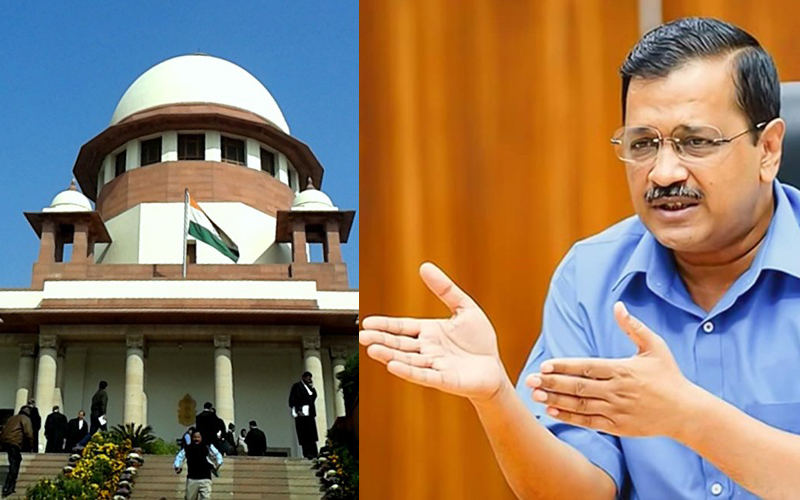
'Won't permit you to perform Delhi CM duties even if we give bail': Supreme Court to Arvind Kejriwal
New Delhi: The Supreme Court on Tuesday said that Delhi Chief Minister Arvind Kejriwal would not be permitted to carry out his official responsibilities as it "may have a cascading effect" even if he is granted interim bail while in jail, media reports said.
However, the court did not take an immediate decision to provide relief for Kejriwal, as the Supreme Court reserved its ruling on his bail petition.
"This is an extraordinary situation. It is not like he is a habitual offender. Elections happen once in five years. It's not like harvesting a crop that will happen every four to six months. We need to consider on priority whether he should be released in the interim," the bench said, reported India Today.
"(Former Union Defence Minister) George Fernandes contested the elections from jail and won with such a huge margin of votes that it was the largest in Indian elections."
The Enforcement Directorate (ED) rejected the court's proposal, saying it would set a "wrong precedent".
"A politician has no special rights as compared to normal citizens. Should all MPs and MLAs facing prosecution be released on bail?" it asked.
The two-judge SC bench asked senior lawyer Abhishek Manu Singhvi, representing the jailed Chief Minister, whether Kejriwal would attend office, sign files and "give directions to others" if he was released on interim bail, the report said.
To this, Singhvi said that Kejriwal "won't be dealing with the excise case. He is a sitting Chief Minister".
The bench stated that if it reaches the decision to release the AAP chief, "we are very clear that we don't want you to be performing official duties since it may have a cascading effect," according to the report.
"We do not want interference at all in the work of the government. It's your wish that you want to continue as Chief Minister. Today, it is not a question of legality but propriety. We are considering the interim bail just because of elections, else we wouldn't have considered it at all," the bench was quoted as saying by India Today.
Singhvi has been asked to address the concerns raised by the Enforcement Directorate.
The issues are, "Can a politician get special treatment compared to a common man. There are 5,000 facing prosecution. What if all of them say they want to campaign? Nine summons over six months? The ED cannot be blamed for choosing time; can interim bail be granted as they haven’t yet gone into evidence?"
During the hearing, the Supreme Court also questioned Additional Solicitor General SV Raju, who represented the Enforcement Directorate, regarding the delay in interrogating and investigating the AAP chief.
"When we began the investigation, our investigation was not directly against him (Kejriwal). His role came up during the investigation. That's why, in the beginning, not a single question was put regarding him. The investigation was not focused on him," SV Raju said.
To this, the bench replied, "This is an unusual case... Why did you take so long, and why were the questions not asked? We take it that no question was asked about him. The only issue was why were you delaying?" the report said.
According to the India Today report, the Additional Solicitor General said if he "started asking about Kejriwal at the outset, it would have been called malafide". "It takes time to understand. We can't put it overnight. Things have to be confirmed."
Tuesday's hearing followed shortly after the Supreme Court's indication on May 3 that it might consider granting interim bail to Kejriwal due to the ongoing Lok Sabha elections.
Arvind Kejriwal, currently jailed at Tihar Jail, filed an appeal with the Supreme Court the day after his petition contesting his arrest and custody was dismissed by the Delhi High Court on April 9.
Support Our Journalism
We cannot do without you.. your contribution supports unbiased journalism
IBNS is not driven by any ism- not wokeism, not racism, not skewed secularism, not hyper right-wing or left liberal ideals, nor by any hardline religious beliefs or hyper nationalism. We want to serve you good old objective news, as they are. We do not judge or preach. We let people decide for themselves. We only try to present factual and well-sourced news.







